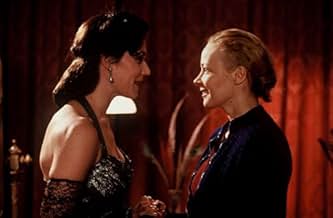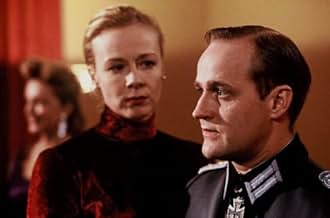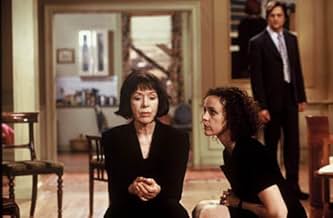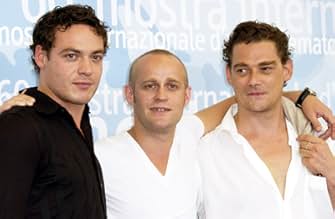VALUTAZIONE IMDb
6,7/10
2591
LA TUA VALUTAZIONE
Aggiungi una trama nella tua linguaAfter the death of her father, Hannah becomes concerned with the strange behavior of her mother. As her mother's troubled childhood is revealed, Hannah realizes how little she ever knew.After the death of her father, Hannah becomes concerned with the strange behavior of her mother. As her mother's troubled childhood is revealed, Hannah realizes how little she ever knew.After the death of her father, Hannah becomes concerned with the strange behavior of her mother. As her mother's troubled childhood is revealed, Hannah realizes how little she ever knew.
- Regia
- Sceneggiatura
- Star
- Premi
- 9 vittorie e 3 candidature totali
Recensioni in evidenza
Film is a cultural product more or less reflecting the trend of a time. Thus, I was made alert when I was watching this slow-tuned movie. Why in such a sudden in the past few years, movies like "Rosenstraße" depicting the humane behaviour of the Germans at wartime mushroom? "The Pianist", "Der Untergang" join the rally.
People may say, "Time heals!" "We need to do justice to the German". True, true, true, doubtlessly, there must have been German citizens who were holding opposing ideas against the Nazi government's. There must be kind-hearted and righteous Germans who protected Jewish people and later got persecuted by their own people. And there is a need to make movies reflecting the true historical facts. These films are 100% not party or government propaganda. My concern here is "timing". Tellingly, why didn't these movies come up in the 70's, 80's or 90's? But early 21st Century when the Neo-Nazi is rising quietly bit by bit today in Germany. I cannot but easily associate these movies to what is really happening in this country.
People may say, "Time heals!" "We need to do justice to the German". True, true, true, doubtlessly, there must have been German citizens who were holding opposing ideas against the Nazi government's. There must be kind-hearted and righteous Germans who protected Jewish people and later got persecuted by their own people. And there is a need to make movies reflecting the true historical facts. These films are 100% not party or government propaganda. My concern here is "timing". Tellingly, why didn't these movies come up in the 70's, 80's or 90's? But early 21st Century when the Neo-Nazi is rising quietly bit by bit today in Germany. I cannot but easily associate these movies to what is really happening in this country.
I went to see the movie for two reasons: 1) Katha Riemann was given a prize for her role in Venice and 2) The story - the rescue of hundreds of Berlin jews, who had been rounded up for deportation in the spring of 1943 - and were being kept by the Gestapo in Rosenstrasse (Rose Street) - is important. The deportation was halted by the non-jewish partners and friends who demonstrated in front of the detainment centre.
However, Trottas movie is extremely disappointing, a pamphlet put on celluloid. The movie is intended to be GOOD, the main characters are intended to be GOOD, the nazis are just EVIL, lustful or downright stupid. Maria Schrader is supposed to be a young jewish New Yorker, trying to understand the unspoken traumas of her German-born mother who survived Rosenstrasse - but never succeeds in convincing me, that she is American. (There is something about her body-language which is much too Continental). Extremely annoying is the use of German in the US scenes....spiced with a few choice english words or sentences which seem totally out of place.
Katja Riemann does add a bit more life to her character - a Preussian baroness and talented pianist, who rescues her jewish husband. (Does she really have to f*** propaganda minister Goebbels to get hubby away from Gestapo- and does Goebbels really have to be portrayed as a - cartoonish - lustful little salivating man, forever chasing a bit of tail, and so plainly disgusting).
We all know Goebbels was a war criminal - but it would have been so more interesting, if the characters were REAL people and the story not just a study in black and white with a stilted dialogue.
However, Trottas movie is extremely disappointing, a pamphlet put on celluloid. The movie is intended to be GOOD, the main characters are intended to be GOOD, the nazis are just EVIL, lustful or downright stupid. Maria Schrader is supposed to be a young jewish New Yorker, trying to understand the unspoken traumas of her German-born mother who survived Rosenstrasse - but never succeeds in convincing me, that she is American. (There is something about her body-language which is much too Continental). Extremely annoying is the use of German in the US scenes....spiced with a few choice english words or sentences which seem totally out of place.
Katja Riemann does add a bit more life to her character - a Preussian baroness and talented pianist, who rescues her jewish husband. (Does she really have to f*** propaganda minister Goebbels to get hubby away from Gestapo- and does Goebbels really have to be portrayed as a - cartoonish - lustful little salivating man, forever chasing a bit of tail, and so plainly disgusting).
We all know Goebbels was a war criminal - but it would have been so more interesting, if the characters were REAL people and the story not just a study in black and white with a stilted dialogue.
Rosenstrasse is more an intimate film than one of epic proportions, which could have kept away many film goers looking for a Pianist similar plot. Fortunately, Von Trotta, a good screenwriter, opts for a feminist peep to an era too much illustrated on its colorful exterior, but too little analyzed in terms of intimacy and from the point of view of ordinary Aryan German rather from a Jewish standpoint. Rosentrasse finds its strength in these unsung burdens of people trapped within historical circumstances of which they emerge as victims. The pace of the film is introspective, poignantly slow, meditative. Besides, the characters are so vivid while transitions between generations and the passing of time has been deftly crafted. Rosenstrasse is not a masterpiece, and some narrative flaws are well discerned. Another fault lies on a trivial cinematography unable to capture the intensity of the internal drama lived by the characters. Nevertheless, this film is worth seeing. Finally, Rosenstrasse is part of the last trend in German films dealing with the ghosts of a nightmarish past,trend that includes such excellent films as Nowhere in Africa, and recently, the controversial Downfall. I would recommend this film to those who know how to read beyond the images.
'A ray of light in hard times' - this is how one of the main heroines characterizes the events described in 'Rosenstrasse', the 2003 film directed by Margarethe von Trotta. The episode took place in February-March 1943 and was one of the few, if not the only, public protest in Nazi Germany against the deportation and extermination of the Jews. The demonstrations took place on Berlin's Roses Street (hence the name of the film) where hundreds of Jews who were to be deported to concentration and extermination camps were held in a former Jewish welfare center. They were organized by the non-Jewish wives of the arrested men, mixed couples having a special status in the context of the racial laws (the Nurenberg laws). This unique public display of solidarity with the Jewish population (albeit motivated by family ties) led to the release of about 1,800 Jews, most of whom survived the war. In German history, the episode is considered as proof that 'it could have been otherwise' and presented as one of the few moments of anti-Nazi civil resistance.
The screenplay (co-written by Margarethe von Trotta and Pamela Katz) is conceived as a journey into family history and rediscovery of identity that is undertaken more than 50 years after the war by Hannah Weinstein, a young Jewish New Yorker. Her mother, about whose biography the daughter knows very little, except that she came to the United States as a child after the war, seems to go through a crisis of identity radicalization, deciding to mourn her deceased husband according to the laws of Jewish orthodoxy and opposing vehemently Hannah's marriage to a young non-Jew. With the help of a cousin who came to her father's funeral, Hannah begins to retrace her mother's biography and discovers that the 8-year-old Jewish girl had been rescued and sheltered during the last years of the war by Lena Fischer, a woman descended from the German aristocracy, who in turn was married to a Jew. Lena still lives in Berlin, and Hannah will travel to meet her. From here, the story of the events in Rosenstrasse is reconstructed through flash-backs that visually translate the accounts of the woman who, almost 60 years ago, had participated in the protests to save her husband, had met and taken under her protection the Jewish girl, remained alone in the world after her mother's deportation.
Margarethe von Trotta is a multi-talented filmmaker - actress, screenwriter, director - who spent the first years of her career in the milieus of the French New Wave and then the German New Cinema, to establish herself in the following decades with films and roles in which she analyzes (especially) German history and brings into debate important figures and moments, some not without controversy. 'Rosenstrasse' is an important film in its very subject matter, but it is an uneven film in its achievement. The most powerful part seemed to me to be the individual stories that reconstruct destinies - many tragic - broken by war and the horrors of the Holocaust. It is the secondary characters, some of whom only appear in a scene or two, that have the best chance of remaining in the viewers' memory. The contemporary plot and especially the episodes set in America don't hold up as solidly and are based too much on stereotypes. As in all of the director's films, the prominent characters are women and the actresses are given the opportunity for solid roles. Maria Schrader (herself a remarkable director and actress) is excellent as the woman on a quest for the truth about her family history and her own identity. Katja Riemann and Doris Schade interpret the role of Lena at both ages with aplomb and dignity. I was less impressed by Jutta Lampe as the mother. The way her role is written does not clarify either her supposed identity crisis or the radical change that occurs towards the end. The episode of the flirtation with Goebbels, which would have led to the release of the prisoners, has been widely criticized, especially in Germany, because it appears to downplay the impact of the women's protests. I think these criticisms are justified, although it seems that, historically, it was indeed Goebbels who ordered the release of the prisoners. Franz Rath's cinematography differentiates the leaps into the past by shooting in gray and metallic shades, almost black and white. 'Rosenstrasse' remains an interesting and important film both for its subject matter and for the discussions it has generated and will continue to generate.
The screenplay (co-written by Margarethe von Trotta and Pamela Katz) is conceived as a journey into family history and rediscovery of identity that is undertaken more than 50 years after the war by Hannah Weinstein, a young Jewish New Yorker. Her mother, about whose biography the daughter knows very little, except that she came to the United States as a child after the war, seems to go through a crisis of identity radicalization, deciding to mourn her deceased husband according to the laws of Jewish orthodoxy and opposing vehemently Hannah's marriage to a young non-Jew. With the help of a cousin who came to her father's funeral, Hannah begins to retrace her mother's biography and discovers that the 8-year-old Jewish girl had been rescued and sheltered during the last years of the war by Lena Fischer, a woman descended from the German aristocracy, who in turn was married to a Jew. Lena still lives in Berlin, and Hannah will travel to meet her. From here, the story of the events in Rosenstrasse is reconstructed through flash-backs that visually translate the accounts of the woman who, almost 60 years ago, had participated in the protests to save her husband, had met and taken under her protection the Jewish girl, remained alone in the world after her mother's deportation.
Margarethe von Trotta is a multi-talented filmmaker - actress, screenwriter, director - who spent the first years of her career in the milieus of the French New Wave and then the German New Cinema, to establish herself in the following decades with films and roles in which she analyzes (especially) German history and brings into debate important figures and moments, some not without controversy. 'Rosenstrasse' is an important film in its very subject matter, but it is an uneven film in its achievement. The most powerful part seemed to me to be the individual stories that reconstruct destinies - many tragic - broken by war and the horrors of the Holocaust. It is the secondary characters, some of whom only appear in a scene or two, that have the best chance of remaining in the viewers' memory. The contemporary plot and especially the episodes set in America don't hold up as solidly and are based too much on stereotypes. As in all of the director's films, the prominent characters are women and the actresses are given the opportunity for solid roles. Maria Schrader (herself a remarkable director and actress) is excellent as the woman on a quest for the truth about her family history and her own identity. Katja Riemann and Doris Schade interpret the role of Lena at both ages with aplomb and dignity. I was less impressed by Jutta Lampe as the mother. The way her role is written does not clarify either her supposed identity crisis or the radical change that occurs towards the end. The episode of the flirtation with Goebbels, which would have led to the release of the prisoners, has been widely criticized, especially in Germany, because it appears to downplay the impact of the women's protests. I think these criticisms are justified, although it seems that, historically, it was indeed Goebbels who ordered the release of the prisoners. Franz Rath's cinematography differentiates the leaps into the past by shooting in gray and metallic shades, almost black and white. 'Rosenstrasse' remains an interesting and important film both for its subject matter and for the discussions it has generated and will continue to generate.
Berlin-born in 1942 Margarethe von Trotta was an actress and now she is a very important director and writer. She has been described, perhaps even unfairly caricatured, as a director whose commitment to bringing a woman's sensibility to the screen outweighs her artistic strengths. "Rosenstrasse," which has garnered mixed and even strange reviews (the New York Times article was one of the most negatively aggressive reviews I've ever read in that paper) is not a perfect film. It is a fine movie and a testament to a rare coalescing of successful opposition to the genocidal Nazi regime by, of all peoples, generically powerless Germans demonstrating in a Berlin street.
Co-writer von Trotta uses the actual Rosenstrasse incident in the context of a young woman's search for information about her mother's never disclosed life as a child in the German capital during World War II.
The husband of Ruth Weinstein (Jutta Lampe) has died and in a surprising reversion to an orthodox Jewish lifestyle apparently hitherto in long abeyance, Ruth not only "sits shivah" (the Jews' week-long mourning ritual) but she insists on following the strict proscriptions of her faith. Her apartment in New York City reflects the affluence secured by her deceased spouse's labors. Her American-born daughter, Hannah (Maria Schrader) and her brother are a bit put-off by mom's assumption of restrictive orthodox Jewish practices but they pitch in. The mother coldly rejects the presence of Hannah's fiance, a non-Jew named Luis (Fedja van Huet). A domestic crisis might well erupt as Ruth warns that she'll disown Hannah if she doesn't give up doting, handsome Luis. Stay tuned.
A cousin arrives to pay her respects and also drops clues to an interested Hannah about a wartime mystery about mom's childhood in Berlin. Hannah is intrigued - she queries her mom who resolutely refuses to discuss that part of her life. This is very, very realistic. I grew up with parents who fled Nazi Germany just in time and I knew many children whose families, in whole but usually in part, escaped the Holocaust. Those days were simply not discussed.
So Hannah, having learned that a German gentile woman saved Ruth's life, traipses off to Berlin hoping to find the savior still breathing. Were she not, this would have been a very short film. But Ruth, pretending to be a historian, locates 90 year-old Lena Fischer (Doris Schade), now a widow. As the happy-to-be-interviewed but shaken up by repressed memories Lena tells her story, the scenes shift fairly seamlessly between present day Berlin and the war-time capital.
The young Lena of 1943 (Katja Riemann) was a fine pianist married to a Jewish violinist, Fabian Fischer (Martin Feifel). With the advent of the Nazi regime he was required to use "Israel" as a middle name just as Jewish women had to add "Sarah" to their names(incidentally I wish IMDb had not given Fabian's name on its characters list with the false "Israel" included-it simply perpetuates a name applied by Nazis as a mark of classification and degradation).
While Germany deported most of its Jewish population to concentration camps, those married to "Aryans" were exempted. For a time. Until 1943 when the regime decided to take them too (most were men; a minority were Jewish women married to non-Jews). The roundup is shown here in all its frightening intensity.
The young Lena tries to locate her husband. All she and many other women know is that they're confined in a building on Rosenstrasse. The crowd of anxious women builds up, some piteously seeking help from German officers who predictably refuse aid and also verbally abuse them ("Jew-loving whore" being one appellation). As a subplot Lena more or less adopts eight-year-old Ruth who hid when her mother was seized (remember, Ruth is now sitting shiva in Manhattan). The child Ruth is fetchingly portrayed by Svea Lohde.
Through increasingly angry protestations the women finally prevail. The men, and a handful of women, are released. As in the real story the Nazis gave in, one of the rare, almost unprecedented times when the madmen acknowledged defeat in their homicidal agenda (another was the termination of the euthanasia campaign to rid the Reich of mental defectives and chronic invalids but that's another story).
Von Trotta builds up the tension and each woman's story is both personal and universal. Hannah continues to prod the aging Lena who slowly, one gathers, begins to suspect she's not dealing with an ordinary historian but rather someone with a need to learn about the girl she rescued, the child whose mother was murdered.
The contrasts between Rosenstrasse of 1943, a set, and the street today in a bustling, rebuilt, unified Berlin provide a recurring thematic element. Today's Berlin bears the heritage but not the scars of a monstrous past. Von Trotta makes that point very well.
The main actors are uniformly impressive. Lena's husband while strong is also shown as totally helpless in the snare of confinement with a likely outlook of deportation (which is shown to have been clearly understood by all characters - including the local police and military - as a one-way trip to oblivion). The older Ruth is catalytically forced to confront demons long suppressed in her happy New York life. Hannah is very believable as a young woman whose father's death triggers a need to discover her family's past. These things happen (although the Times's critic appears not to know that).
Von Trotta's hand is sure but not perfect. A scene with Goebbels at a soiree enjoying Lena's violin playing is unnecessary and distractive. The suggestion that she may have gone to bed with the propaganda minister, the most fanatical top-level Hitler worshiper, to save her husband detracts from the wondrous accomplishment of the demonstrating spouses and relatives. Most of the German officers come from central casting and are molded by the Erich von Stroheim "copy and paste" school of Teutonic nastiness. But that's understandable.
The Rosenstrasse story has been the subject of books and articles and some claim it's a paradigm case for arguing that many more Jews could have been saved had more Germans protested. Unfortunately that argument is nonsense. The German women who occupied Rosenstrasse were deeply and understandably self-interested. Most Germans were located on a line somewhere between passive and virulent anti-Semitism. THAT'S why the Rosenstrasse protest was virtually singular. Whether one buys or rejects the Goldenhagen thesis that most Germans were willing accomplices of the actual murderers it just can not be denied that pre-Nazi endemic anti-Semitism erupted into a virulent strain from 1933 on.
The elderly Lena remarks that what was accomplished by the women was "a ray of light" in an evil time. Most of the men and women sprung from a near death trip survived the war. So "a ray of light" it was and von Trotta's movie is a beacon of illumination showing that some were saved by the courage of largely ordinary women and for every life saved an occasion for celebration exists. And always will.
9/10
Co-writer von Trotta uses the actual Rosenstrasse incident in the context of a young woman's search for information about her mother's never disclosed life as a child in the German capital during World War II.
The husband of Ruth Weinstein (Jutta Lampe) has died and in a surprising reversion to an orthodox Jewish lifestyle apparently hitherto in long abeyance, Ruth not only "sits shivah" (the Jews' week-long mourning ritual) but she insists on following the strict proscriptions of her faith. Her apartment in New York City reflects the affluence secured by her deceased spouse's labors. Her American-born daughter, Hannah (Maria Schrader) and her brother are a bit put-off by mom's assumption of restrictive orthodox Jewish practices but they pitch in. The mother coldly rejects the presence of Hannah's fiance, a non-Jew named Luis (Fedja van Huet). A domestic crisis might well erupt as Ruth warns that she'll disown Hannah if she doesn't give up doting, handsome Luis. Stay tuned.
A cousin arrives to pay her respects and also drops clues to an interested Hannah about a wartime mystery about mom's childhood in Berlin. Hannah is intrigued - she queries her mom who resolutely refuses to discuss that part of her life. This is very, very realistic. I grew up with parents who fled Nazi Germany just in time and I knew many children whose families, in whole but usually in part, escaped the Holocaust. Those days were simply not discussed.
So Hannah, having learned that a German gentile woman saved Ruth's life, traipses off to Berlin hoping to find the savior still breathing. Were she not, this would have been a very short film. But Ruth, pretending to be a historian, locates 90 year-old Lena Fischer (Doris Schade), now a widow. As the happy-to-be-interviewed but shaken up by repressed memories Lena tells her story, the scenes shift fairly seamlessly between present day Berlin and the war-time capital.
The young Lena of 1943 (Katja Riemann) was a fine pianist married to a Jewish violinist, Fabian Fischer (Martin Feifel). With the advent of the Nazi regime he was required to use "Israel" as a middle name just as Jewish women had to add "Sarah" to their names(incidentally I wish IMDb had not given Fabian's name on its characters list with the false "Israel" included-it simply perpetuates a name applied by Nazis as a mark of classification and degradation).
While Germany deported most of its Jewish population to concentration camps, those married to "Aryans" were exempted. For a time. Until 1943 when the regime decided to take them too (most were men; a minority were Jewish women married to non-Jews). The roundup is shown here in all its frightening intensity.
The young Lena tries to locate her husband. All she and many other women know is that they're confined in a building on Rosenstrasse. The crowd of anxious women builds up, some piteously seeking help from German officers who predictably refuse aid and also verbally abuse them ("Jew-loving whore" being one appellation). As a subplot Lena more or less adopts eight-year-old Ruth who hid when her mother was seized (remember, Ruth is now sitting shiva in Manhattan). The child Ruth is fetchingly portrayed by Svea Lohde.
Through increasingly angry protestations the women finally prevail. The men, and a handful of women, are released. As in the real story the Nazis gave in, one of the rare, almost unprecedented times when the madmen acknowledged defeat in their homicidal agenda (another was the termination of the euthanasia campaign to rid the Reich of mental defectives and chronic invalids but that's another story).
Von Trotta builds up the tension and each woman's story is both personal and universal. Hannah continues to prod the aging Lena who slowly, one gathers, begins to suspect she's not dealing with an ordinary historian but rather someone with a need to learn about the girl she rescued, the child whose mother was murdered.
The contrasts between Rosenstrasse of 1943, a set, and the street today in a bustling, rebuilt, unified Berlin provide a recurring thematic element. Today's Berlin bears the heritage but not the scars of a monstrous past. Von Trotta makes that point very well.
The main actors are uniformly impressive. Lena's husband while strong is also shown as totally helpless in the snare of confinement with a likely outlook of deportation (which is shown to have been clearly understood by all characters - including the local police and military - as a one-way trip to oblivion). The older Ruth is catalytically forced to confront demons long suppressed in her happy New York life. Hannah is very believable as a young woman whose father's death triggers a need to discover her family's past. These things happen (although the Times's critic appears not to know that).
Von Trotta's hand is sure but not perfect. A scene with Goebbels at a soiree enjoying Lena's violin playing is unnecessary and distractive. The suggestion that she may have gone to bed with the propaganda minister, the most fanatical top-level Hitler worshiper, to save her husband detracts from the wondrous accomplishment of the demonstrating spouses and relatives. Most of the German officers come from central casting and are molded by the Erich von Stroheim "copy and paste" school of Teutonic nastiness. But that's understandable.
The Rosenstrasse story has been the subject of books and articles and some claim it's a paradigm case for arguing that many more Jews could have been saved had more Germans protested. Unfortunately that argument is nonsense. The German women who occupied Rosenstrasse were deeply and understandably self-interested. Most Germans were located on a line somewhere between passive and virulent anti-Semitism. THAT'S why the Rosenstrasse protest was virtually singular. Whether one buys or rejects the Goldenhagen thesis that most Germans were willing accomplices of the actual murderers it just can not be denied that pre-Nazi endemic anti-Semitism erupted into a virulent strain from 1933 on.
The elderly Lena remarks that what was accomplished by the women was "a ray of light" in an evil time. Most of the men and women sprung from a near death trip survived the war. So "a ray of light" it was and von Trotta's movie is a beacon of illumination showing that some were saved by the courage of largely ordinary women and for every life saved an occasion for celebration exists. And always will.
9/10
Lo sapevi?
- QuizIt took Margarethe von Trotta almost 10 years to realize this project for financial reasons.
- ConnessioniFeatured in Katja Riemann (2006)
- Colonne sonoreSonata for Piano and Violin in A
'Allegretto Moderato' - César Franck (op. 446 198 2)
Courtesy of UNIVERSAL CLASSICS & JAZZ - a division of UNIVERSAL MUSIC GmbH
I più visti
Accedi per valutare e creare un elenco di titoli salvati per ottenere consigli personalizzati
- How long is Rosenstrasse?Powered by Alexa
Dettagli
Botteghino
- Lordo Stati Uniti e Canada
- 734.519 USD
- Lordo in tutto il mondo
- 6.075.609 USD
- Tempo di esecuzione2 ore 16 minuti
- Colore
- Mix di suoni
- Proporzioni
- 2.35 : 1
Contribuisci a questa pagina
Suggerisci una modifica o aggiungi i contenuti mancanti






































